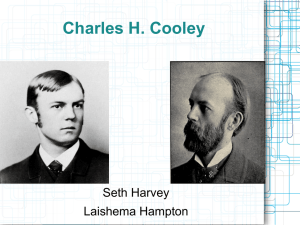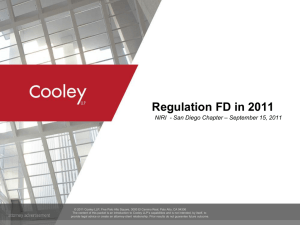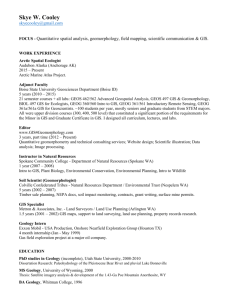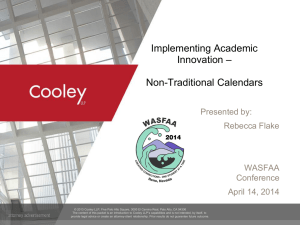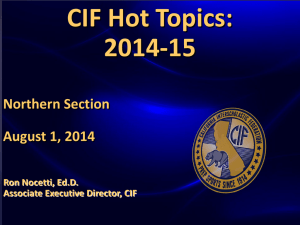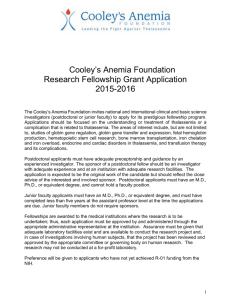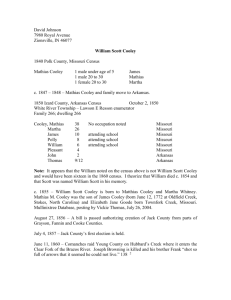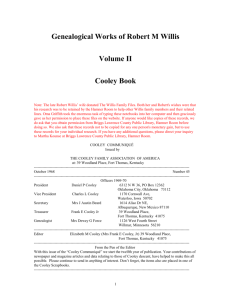LEADER RESEARCH PROJECT–Sarah Nemeth
advertisement
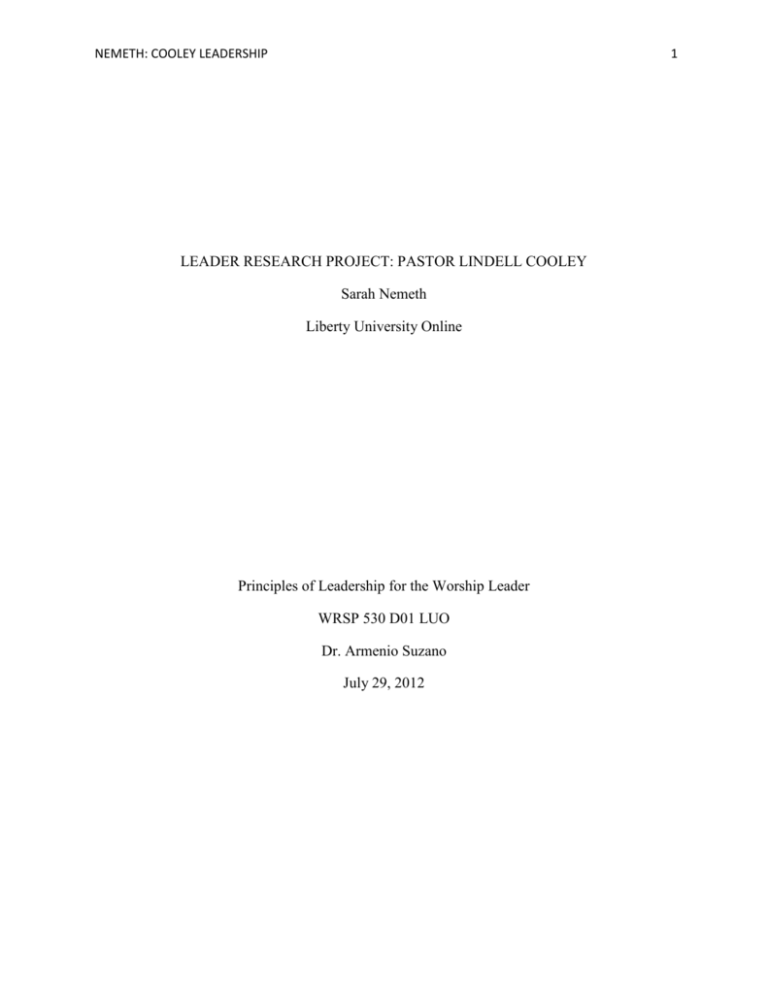
NEMETH: COOLEY LEADERSHIP 1 LEADER RESEARCH PROJECT: PASTOR LINDELL COOLEY Sarah Nemeth Liberty University Online Principles of Leadership for the Worship Leader WRSP 530 D01 LUO Dr. Armenio Suzano July 29, 2012 NEMETH: COOLEY LEADERSHIP 2 Lindell Cooley is ready for the end of “IBM leadership.” Not the wealth of imaginative technology that has crashed into the pulpit in the past decade. In his Nashville church, Cooley sometimes uses an iPad to reference his notes during a sermon. His worship team has the hip flavor of modern Evangelical charismatic church bands. But gone are the days of suits, choir robes and 90s Vineyard choruses. Cooley’s revivalist roots often bleed through in his Finney-like preaching, but his is not leadership-by-number and there is room for more than one helmsman. It is a different sort of way he espouses—an American-washed, southern-bred, Spirit-filled creative leadership, and he makes no apologies for it. “In [America] we’re an arts-driven society,” Cooley said. “We haven’t seen a lot of people in the arts being a leader in the church. God said to me, ‘I have need of creative people to lead the church.” Artistic license and leeway aside, Cooley said it is time for some change. “We the Church have recently become [focused on] making it comfortable for the lost,” he said, adding that other religions do not expect to appease new converts in the same way contemporary Christianity seems to. And, perhaps, comfortable is exactly the opposite of what leadership in the post-modern Church should be. Behind the Scenes Cooley, a preacher’s son who grew up in Red Bay, Alabama, has spent time as a pastor, studio musician and producer and possibly most famously as the music minister for the Brownsville Revival in Pensacola, Florida. After ten years at Brownsville, Cooley felt God NEMETH: COOLEY LEADERSHIP 3 calling him to found a church of his own. He settled in Nashville—where he was working when he was tapped for the Brownsville slot—and began Grace Church: Nashville, with only a handful of worshipers. Today, the church has outgrown its original home at a YMCA in Franklin, Tennessee and has recently nested into a much larger facility of its own. Cooley also hosts an annual music conference called, Encounter, and releases some of the music services as records. His decision to leap into the position of lead pastor was not one he made with the ease of standing at his keyboard leading hundreds of thousands of souls in worship. The choice for head leadership was far more challenging to him. “God took me on a three-year journey to study the life of David,” Cooley said. “It was almost like I couldn’t read anything else.” In one year, he read through the typical, and atypical, information about Israel’s second king. And then he read it all again. Ready to move on from his repetitive study, Cooley decided to write down the basic things he had learned about what David was, including a great king, a man of humility who did not seek out his office, a priest and a prophet. Creative Leadership What hit Cooley the most in his study was that David was a perpetual musician. For a man prone to musical artistry and leadership, God’s message to Cooley hit the high notes. “All creativity comes from the Lord, He’s the great Creator,” Cooley said. “In Nashville it’s all about creativity. But no one spends much time getting to know the Creator. If [mere] creativity is what you worship, then you’ll keep re-creating the same things.” NEMETH: COOLEY LEADERSHIP 4 In his leadership role—Cooley is still a worship leader and regularly leads song services at his church—Cooley emphasizes staying connected to the Spirit of God, rather than intellectual striving. “True creativity comes from the Spirit,” he said. “His thoughts and abilities and creativity are infinite. [We need to] close the door and shut the radio off and talk to God and speak to Him and listen to Him.” It is no surprise that Cooley fancies artistry in music. But as a senior pastor of eight years now, he is superimposing his creative thumbprint onto his team of ministers and congregation. He gleans leadership lessons from people who have left their own mark on his life—people like pastors John Kilpatrick and L.H. Hardwick. “You need to always look up and find someone you’re looking up to,” Cooley said. “We are made honestly to need that.” Sometimes, being a leader involves showing humility toward those who are leading above you. “Paul told us to pray for our leaders, and when he said that he was talking about Nero,” Cooley said. “I feel like the church has failed that test in America because we’re so independent. My job is to honor because that has direct relationship to how I am honored.” What’s so bad about…? Humility translated to those under your leadership looks, to Cooley, a lot like taking the fall. “Sometimes you just need to take the blame,” he said, referring to situations that are obviously not matters of Scriptural adherence. “If it’s a misunderstanding, humble yourself.” NEMETH: COOLEY LEADERSHIP 5 With skin on, such a method might include showing humility to those you are leading. Cooley suggests three things for humble leadership. First, “Magnify the good in people,” he said. “Build on their strengths, not their weaknesses. Second, “Don’t punish someone for what they’re not good at. Put them in places that they excel. On the team I really love to bring people together from within. Morale can be killed by bringing everybody in. It’s harder, but it’s way more rewarding.” Finally, Cooley suggests endearing yourself to those around you. “They’ve got to believe in what you believe in, but it’s hard to do that when they don’t like you. People tend to lose morale when they feel out of control. Tell them you trust them to do [a] task.” Cooley mentioned celebrating failures and having a fluid church government as other vital components of creative leadership. Know when to hold it Though his preaching is bold and unapologetic, Cooley is careful not to stray into arenas he believes the pulpit was never intended for. “We can never compromise the Scripture,” he said with conviction. “[But] I feel like the pulpit is a sacred place, a holy place. We’ve set it aside as a sanctified place. I feel it’s degrading to that place to bring the political into that.” That does not mean that Cooley is afraid to face weighty matters in his proverbial preacher’s frock. He has had to address issues within his own church, but generally takes the NEMETH: COOLEY LEADERSHIP stance that social issues—abortion, gay marriage and homosexuality are on this list—are often borne out of spiritual matters. “Jesus was never politically explosive,” Cooley said. “If you’ve preached the Word of God it will convict on its own. We’re trying to deal with a spiritual issue with natural man.” 6 NEMETH: COOLEY LEADERSHIP Bibliography Cooley, Lindell, “About Grace Church: Nashville > About the Pastors.” Grace Church: Nashville, http://gracechurchnashville.com/about/aboutpastors.html (accessed July 29, 2012). Lindell Cooley, telephone interview by author, July 26, 2012. 7
